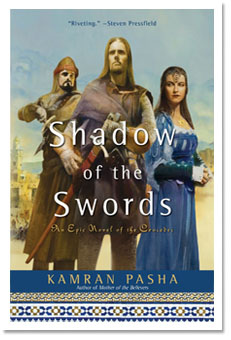This book is a work of fiction. While based on historical events, it is not a history of those events. Readers who are interested in learning more about the history of Islam and the lives of Prophet Muhammad and his wife Aisha are encouraged to read some of the wonderful reference works that I have relied on to craft this tale. These books include the brilliantly crafted biography by Martin Lings entitled Muhammad: His Life Based on the Earliest Sources, as well as the excellent works by Barnaby Rogerson, including The Prophet Muhammad: A Biography and Heirs of Muhammad.
Those interested in seeking a Western scholarly perspective on Muhammad's life and legacy are referred to Montgomery Watt's seminal work Muhammad: Prophet and Statesman, as well as Karen Armstrong's influential book Muhammad: A Biography of the Prophet.
Readers seeking more information about Aisha will find a wealth of information on her and other prominent Muslim women in Jennifer Heath's The Scimitar and The Veil: Extraordinary Women of Islam. For those fascinated by the military history surrounding the rise of Islam, a wonderfully readable analysis can be found in Richard A. Gabriel's Muhammad, Islam’s First General. Hugh Kennedy's The Great Arab Conquests is also a fine resource for those seeking insight into how a small band of desert warriors improbably created a vast empire and a civilization that remains vibrant and influential on the world scene today.
Readers interested in a general introduction to the faith and practices of Islam are referred to The Compete Idiot’s Guide to Islam by Yahiya Emerick, and No god but God by Reza Aslan. Those who wish to gain deeper insight into the spiritual values of Islam and what the religion offers the world today are referred to Islam and the Destiny of Man by Charles Le Gai Eaton and The Secret of Islam by Henry Bayman. A deeper look at the spiritual heart of Islam can be found in The Vision of Islam by Sachicko Murata and William Chittick, and in the classic text Understanding Islam by Frithjof Schuon.
There are many translations of the Holy Qur'an on the market today, but I have found three to be particularly helpful to Western readers. Abdullah Yusuf Ali's The Qur'an: Text, Translation and Commentary is one of the most beloved of English translations and is helpful to those who are new to studying the Muslim faith. Muhammad Asad's monumental translation The Message of the Holy Qur'an is both scholarly and written from the point of a view of a European convert who understands how to explain the scripture to the Western mind. For those seeking a simple translation that is not bogged down with commentary, I recommend The Qur'an, translated by M.A.S. Abdel Haleem for Oxford University Press. An older but still popular translation is The Glorious Qur'an by Muhammad Marmaduke Pickthall, a British convert.
Writing a fictional novel about the birth of Islam and the remarkable personalities of Prophet Muhammad, Aisha and the rest of the early Muslim community has been an extremely challenging and rewarding process. Compared to the limited historical data available on Jesus, the origins of Islam and the life of the Prophet have been documented with a level of historical detail that is mind boggling to many Westerners. It has been said that we know more about Muhammad than we do about any other man in history, as his followers meticulously recorded everything they could about their beloved teacher, from how he looked, to his daily mannerisms and eating habits, to surprisingly intimate details about his personal life with his wives. Much of this can be credited to the remarkable memory of Aisha, who was responsible for transmitting over two thousand individual hadiths, or oral accounts of her life with the Prophet and his teachings.
The corpus of historical data about Prophet Muhammad is staggering in its depth and detail, but his life remains a matter of controversy. Believers and non-believers will obviously interpret the tale around Muhammad in accordance with their own perspective about the truth of his spiritual mission. And within the Muslim community itself, interpretation of historical events is often hotly debated between the different sects of Sunni and Shia Islam.
For the record, I am a believing and practicing Muslim. Theologically I consider myself a Sunni, and spiritually I am drawn to Sufism, the mystical heart of Islam. By lineage, I am a sayyid, a direct descendant of the Prophet through his daughter Fatima and his grandson Husayn. For me, this novel has been both a rewarding journey into the heart of my religious tradition, as well as an eye-opening study of the passionate and complex people who were my ancestors. They were simple men and women, living in a remote desert, who should have been forgotten by history. And yet through the sheer power of faith, they managed to turn the world upside down.
I should note that not all Muslims would agree with my personal interpretation of Islam in these pages, or with my portrayal of the Prophet's life and of Aisha's role in Muslim history. And that is fine. I encourage those who disagree with my presentation to write books that reflect the truth as their hearts see it. In fact, I hope a day comes that novels about Prophet Muhammad, Aisha and Ali become as commonplace in Western literature as the diverse and beloved books on historical figures such as Alexander the Great, Julius Caesar, Cleopatra and Queen Elizabeth I.
My intention with this novel is to open to Westerners a glimpse of the richness that exists within the Muslim historical tradition, and to invite all my readers to learn more about Islam and draw their own conclusions. To the extent that I have succeeded, the credit belongs to God alone. The failures, however, are all mine.


